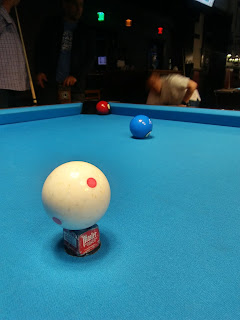Mirroring vs. Reavers at High Tea
The more we learn about psychology, and the more psychology learns about itself, the quicker we assess a person in whom we find challenges. Our pattern-extracting brains seek a path to agreement, in other words seek to eliminate discomfort. We want to connect; when we can't, we want to know why. This one sounds like a narcissist; that one over there clearly has control issues. Be wary of people who seem co-dependent. The easy thing is to assign labels for quick sorting. It feels like a safeguard.
At some point, society chooses how we should approach one another, and when, and how much. Kids learn by getting feedback from their parents, mirroring. I take cues from others when I communicate, looking for the way someone wants to receive information. Sometimes, though, I'm looking for something to mirror and I have no idea what I'm looking at. I don't get it right; things turn awkward, and suddenly there's a mess.
I've always been The Weird Kid. People often call me random, but I'm actually continuing a conversation already begun, perhaps days or years ago. I have to be cognizant that everyone else does not remember what I do. I have a few friends who have long-term conversations with me, and they're irreplaceable.
Humans in general confuse me. The only thing I comprehend is forthrightness, and sometimes that comes with barbs and daggers, dropping brutally from the gangplank like Reavers. I'm not bothered by it, but some people are really unaccustomed to wrestling rawness. I know how to cut sandwiches into cute shapes and sometimes I like'm like that, but sometimes Reavers drop into the middle of high tea. I'm inclined to pour each cannibal a cuppa and people look at me like I did something crazy.
Diana Gonzalez explained herself in words which can well apply to me:
Some people prefer to see a glamorous version of themselves when they look at you. This is why I gravitate toward brutal truth-tellers; they can usually take as much as they serve. Little is left to interpretation. I don't want to see myself pretty when I look at you; I want to see YOU. If you're trying to mirror me, you probably look confused (but fabulous.)
It's been suggested that social protocol could be taught in school. At first I disagreed, but I quickly realised: much like sex education, the conversations that should happen at home often don't. Or maybe they do but the nuances are not digested by ultra-literal brains. I hear there's a spectrum for that.
Can a person be assigned more than one label? OF COURSE WE CAN. One label per person will almost certainly not suffice. Diana probably is literally both very charming and totally brutal, and other things. I know I am. Maybe not so much sherbet, but more like sherbet with raw cocoa beans and sprinkled with red chile. Put some bourbon in that teacup, yeah?
How much are we irritated by the demons of others because we can name them, where we may have been more patient before we knew the labels? How much are we letting our own demons cherry-pick what we tolerate?
We don't want to judge, but diagnosing is the same thing, isn't it? Deciding what's wrong with them is never going to be a good way out of an awkward conversation. I try to keep handy the sentence I learned from Certified HSP Coach Anne Sabagh:
Some days I like to leave the door open with a kiddie-gate in place. Fresh air is good, and I can reach over and shake hands, practice mirroring, or pour you a cuppa. Come over.
Further reading:
What's the difference between projecting and mirroring? Stack Exchange
Everybody knows some psych terms these days; make sure you're using them correctly.
As the Crow Flies Studio - Facebook
Get to know Diana Gonzalez and her art here.
At some point, society chooses how we should approach one another, and when, and how much. Kids learn by getting feedback from their parents, mirroring. I take cues from others when I communicate, looking for the way someone wants to receive information. Sometimes, though, I'm looking for something to mirror and I have no idea what I'm looking at. I don't get it right; things turn awkward, and suddenly there's a mess.
I've always been The Weird Kid. People often call me random, but I'm actually continuing a conversation already begun, perhaps days or years ago. I have to be cognizant that everyone else does not remember what I do. I have a few friends who have long-term conversations with me, and they're irreplaceable.
Humans in general confuse me. The only thing I comprehend is forthrightness, and sometimes that comes with barbs and daggers, dropping brutally from the gangplank like Reavers. I'm not bothered by it, but some people are really unaccustomed to wrestling rawness. I know how to cut sandwiches into cute shapes and sometimes I like'm like that, but sometimes Reavers drop into the middle of high tea. I'm inclined to pour each cannibal a cuppa and people look at me like I did something crazy.
Diana Gonzalez explained herself in words which can well apply to me:
I've been called both very charming, and totally brutal.
The first is those people who encounter me when I'm mirroring them. Their words, gestures, tone of voice. I'm reflecting what they're showing me, so they connect with what they see. I don't do it to be dishonest. I do it because I have no earthly idea how to interact with other humans, and I figure if I do what you do it'll work out. It's all very conscious on my part. I'll also default to behaving like my auntie, who everyone loves because she smiles a lot and she's very warm and energetic.
The second is those people who are just not liking what they hear. I don't know how to tell polite social lies. Well, that's not correct. I do, I just have to be thinking about it. If I'm not focused on it, I'll just say what I see or feel about a thing without considering that honesty in the form of utter bluntness is not really valued unless specifically asked for, and even then should probably be worded carefully.
Some people prefer to see a glamorous version of themselves when they look at you. This is why I gravitate toward brutal truth-tellers; they can usually take as much as they serve. Little is left to interpretation. I don't want to see myself pretty when I look at you; I want to see YOU. If you're trying to mirror me, you probably look confused (but fabulous.)
It's been suggested that social protocol could be taught in school. At first I disagreed, but I quickly realised: much like sex education, the conversations that should happen at home often don't. Or maybe they do but the nuances are not digested by ultra-literal brains. I hear there's a spectrum for that.
Can a person be assigned more than one label? OF COURSE WE CAN. One label per person will almost certainly not suffice. Diana probably is literally both very charming and totally brutal, and other things. I know I am. Maybe not so much sherbet, but more like sherbet with raw cocoa beans and sprinkled with red chile. Put some bourbon in that teacup, yeah?
How much are we irritated by the demons of others because we can name them, where we may have been more patient before we knew the labels? How much are we letting our own demons cherry-pick what we tolerate?
We don't want to judge, but diagnosing is the same thing, isn't it? Deciding what's wrong with them is never going to be a good way out of an awkward conversation. I try to keep handy the sentence I learned from Certified HSP Coach Anne Sabagh:
"I'm sorry, this is something I can't (discuss/do) with you right now."Closing the door, not slamming. Owning the part of interaction I should own, because the demons of others are not my business. Whether or how I choose to interact with them is. Recede, reassess. The key here is not to know why a person isn't good for you, but to simply know yourself, to notice that now may be a good time to step back.
Some days I like to leave the door open with a kiddie-gate in place. Fresh air is good, and I can reach over and shake hands, practice mirroring, or pour you a cuppa. Come over.
Further reading:
What's the difference between projecting and mirroring? Stack Exchange
Everybody knows some psych terms these days; make sure you're using them correctly.
As the Crow Flies Studio - Facebook
Get to know Diana Gonzalez and her art here.











Comments
Post a Comment
Please comment. Just Don't be a dick. Please subscribe to this blog. Email confirmation will be sent - please verify your decision to receive my validations.